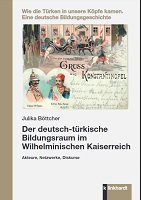Der deutsch-türkische Bildungsraum im Wilhelminischen Kaiserreich
Akteure, Netzwerke, DiskurseAkteure, Netzwerke, Diskurse
| dc.contributor.author | Böttcher, Julika | |
| dc.date.accessioned | 2023-02-07T12:13:47Z | |
| dc.date.available | 2023-02-07T12:13:47Z | |
| dc.date.issued | 2023 | |
| dc.identifier | OCN: 1371953614 | |
| dc.identifier.uri | https://library.oapen.org/handle/20.500.12657/61189 | |
| dc.description.abstract | Today's ignorance of German-Turkish relations before the 1961 recruitment agreement stands in astonishing contrast to the attention paid to the Ottoman Empire before and during the First World War. Using a variety of previously unknown historical sources, the author reconstructs how German pedagogy and teachers in the Wilhelmine Empire contributed to the shaping of a German-Turkish educational space. To this end, she takes a transnational perspective on the actors, networks, and discourses that flanked Germany's world power ambitions at the time in terms of cultural policy. With her study, she makes an insightful contribution to the postcolonial historiography of pedagogy and educational science. | en_US |
| dc.language | German | en_US |
| dc.relation.ispartofseries | Wie die Türken in unsere Köpfe kamen. Eine deutsche Bildungsgeschichte | en_US |
| dc.subject.classification | thema EDItEUR::J Society and Social Sciences::JN Education | en_US |
| dc.subject.other | Bildungsgeschichte; historische Bildungsforschung; Wilhelminisches Kaiserreich; Türkei; Postkoloniale Geschichtsschreibung; Osmanisches Reich; Erster Weltkrieg; Transnationale Geschichte; Bildungsraum, Ernst Jäckh; Franz Schmidt; Otto Eberhard | en_US |
| dc.title | Der deutsch-türkische Bildungsraum im Wilhelminischen Kaiserreich | en_US |
| dc.title.alternative | Akteure, Netzwerke, DiskurseAkteure, Netzwerke, Diskurse | en_US |
| dc.type | book | |
| oapen.abstract.otherlanguage | Das heutige Nicht-Wissen um die deutsch-türkischen Beziehungen vor dem Anwerbeabkommen von 1961 steht in erstaunlichem Gegensatz zu der Aufmerksamkeit, die dem Osmanischen Reich vor und während des Ersten Weltkriegs entgegengebracht wurde. Anhand einer Vielzahl bisher unbekannter historischer Quellen rekonstruiert die Autorin, wie deutsche Pädagogik und Lehrerschaft im Wilhelminischen Kaiserreich zur Ausgestaltung eines deutsch-türkischen Bildungsraums beitrugen. Dazu nimmt sie aus einer transnationalen Perspektive Akteure, Netzwerke und Diskurse in den Blick, die die damaligen deutschen Weltmachtambitionen kulturpolitisch flankierten. Mit ihrer Studie leistet sie einen aufschlussreichen Beitrag zur postkolonialen Geschichtsschreibung von Pädagogik und Erziehungswissenschaft. | en_US |
| oapen.identifier.doi | 10.35468/5987 | en_US |
| oapen.relation.isPublishedBy | 9a084ee3-3f86-4be2-81d6-89c9fbc5f173 | en_US |
| oapen.relation.isFundedBy | 631ac483-8bae-460f-9987-c3f4e4b98bb5 | en_US |
| oapen.relation.isbn | 9783781525474 | en_US |
| oapen.series.number | 3 | en_US |
| oapen.pages | 280 | en_US |
| oapen.place.publication | Bad Heilbrunn | en_US |

